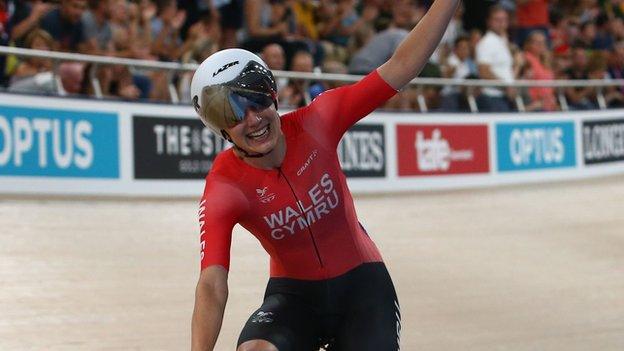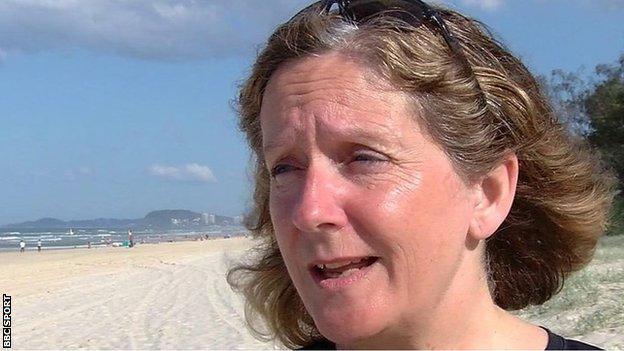Covid-19: Restrictions creating 'huge challenge’ for athletes - Team Wales boss
- Published

Elinor Barker won gold at the 2018 Commonwealth Games
Team Wales chef de mission, Professor Nicola Phillips, says the current Covid restrictions are creating 'a huge challenge' for athletes hoping to get to this summer's Commonwealth Games in Birmingham.
But she remains hopeful of leading a successful Welsh team into what could be a 'real celebration of sport' after two tough years.
The Birmingham Games begin in under 200 days. But Phillips says the next two months are 'crucial' for athletes chasing vital qualifying standards across almost 20 different Commonwealth sports.
The Welsh Government says it has ensured elite athletes have been able to train and compete in their respective sports in a safe manner throughout the pandemic.
Phillips says events being cancelled and difficulties travelling around Europe are the biggest issues.
"Our athletes - many of them - are still trying to get the performances they need to qualify," Phillips told BBC Sport Wales.
"With some events now being cancelled, that creates a huge challenge for them.
"I wouldn't want them to fall at the last hurdle."
Phillips says she fully supports why the Welsh Government has introduced more Covid restrictions, which limit any indoor organised events to 30 people and outdoor organised events to 50
First Minister Mark Drakeford said last week that Wales would look to ease restrictions at the earliest safest opportunity - but that the peak of the Omicron wave was not expected for another 10-14 days.
The National Track Cycling Championships, due to be held in Newport later this month, have been postponed and the Welsh Senior Indoor Athletics Championships could be under threat.
Events are also being cancelled across Europe, meaning fewer opportunities for Welsh athletes to secure qualifying standards.
"The next couple of months are crucial for so many athletes," Phillips continued.
"The next month in particular is about athletes being able to try to get to competition, to get a recorded time or performance, to compete against people to get their rankings.
"All those things are happening now and they are going to make a huge difference for the summer. So I just hope that they can get to the relevant events to do that. It's just so important.
"What we're trying to do is argue their case with the Commonwealth Games Federation and with Birmingham [Games organisers] to maybe give them a bit more time or maybe make some special cases where events have been cancelled through no fault of their own and to look at other performances.
"So that's our role there as a supportive one. But I do feel for these athletes who have been working so hard."
Despite a challenging build-up, Phillips is optimistic about the Birmingham Games - which begin on 28 July.
The Cardiff University professor, who received an OBE in 2019 for services to physiotherapy, led Team Wales to its most successful Commonwealth Games in Gold Coast, Australia in 2018.
She also organised Team GB's preparation camp in Japan ahead of the Tokyo Olympic Games last summer.

Nicola Phillips also led Team Wales at the Gold Coast Commonwealth Games in 2018.
Phillips believes Birmingham will host an exciting Games but she is preparing for Covid-19 to still have an impact, with strict athlete 'bubbles' within Team Wales a possibility.
There will also be the additional challenge of the athletes' 'village' being divided across three sites in the West Midlands, along with a smaller site near the track cycling events in London, after plans for one £500m village were abandoned due to construction delays early in the pandemic.
"I think Birmingham will be somewhere in the middle of those two extremes of the Gold Coast [in 2018] and of Tokyo [in 2021]," said Phillips. "That's probably where our planning is sitting - obviously with contingency plans either way.
"But we are now in three villages rather than one big village and so making sure we create that team approach is going to be more challenging. But also to make sure we provide the same support and services across those three sites, as well as the satellite site in London.
"But we also need to look at athlete safety and team official safety and our job is to maximise the chances of those athletes being able to compete.
"So depending on where the restrictions sit, we might be more or less limited in how people go outside the bubble, for instance. Do we impose different restrictions on Team Wales compared to the basic restrictions that might be held?
"That will all be down to a risk assessment and we will obviously talk with the sports about how we work through it."
'A chance to be role models'
Phillips knows it will be a tall order to match the highs of Gold Coast 2018, when Team Wales won 36 medals (including ten golds) to finish seventh in the medal table.
But she believes her athletes will go to Birmingham with an even greater responsibility - reinvigorating a nation's enthusiasm for sport after two years of on-and-off restrictions.
"If a Welsh team does well in something, people feel good," Phillips continued. "Whether you do sport or not, you feel good seeing the success of somebody.
"It is a unique opportunity for our athletes to compete for Wales. That goes without saying.
"But I also think it gives a chance for them to be role models for people in Wales, especially young children to see somebody who might look like them competing in a sport that maybe they've not seen before and they might go and have a try.
"I think we do have a responsibility to help encourage those people to go back into sport because there is a bit of a reticence still because it's been so long."

SLAMMED: The story of Wales’ transformation from rugby rejects to rugby royalty
FA CUP'S BIGGEST SHOCK: Remembering Wrexham's victory against Arsenal 20 years on
